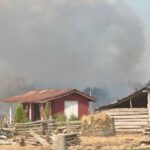In a controversial display of civil disobedience, demonstrators in Nova Scotia deliberately defied provincial burn restrictions Tuesday evening, lighting a campfire at Grand Parade in Halifax to protest what they describe as government overreach in woodland management policies.
The protesters, who identify themselves as members of the recently formed Forest Protectors Alliance, ignited the small campfire despite the province-wide burn ban that remains in effect following one of the most devastating wildfire seasons in Nova Scotia’s recent history. The demonstration came just hours after provincial officials announced increased penalties for those violating burn restrictions, with fines now reaching up to $25,000.
“We understand the seriousness of fire safety, but the government’s approach to forest management has become increasingly authoritarian,” said Marcus Thornhill, a spokesperson for the group who was present at the protest. “These new penalties are disproportionate and target rural communities who have responsibly managed forest land for generations.”
Halifax Regional Police arrived at the scene shortly after the fire was lit, issuing citations to three individuals. A department spokesperson confirmed that charges are pending under both municipal bylaws and provincial regulations. The identities of those charged have not yet been released.
The provincial Department of Natural Resources and Renewables defended the heightened restrictions and penalties in a statement released Wednesday morning. “Last year’s wildfires destroyed over 23,000 hectares of forest and forced thousands from their homes,” said Deputy Minister Eleanor Wentworth. “The increased penalties reflect the gravity of the risk posed by unauthorized burning during high-danger periods.”
Environmental policy experts have noted the unusual nature of the protest. Dr. Caroline Hubert, Professor of Environmental Studies at Dalhousie University, told CO24 News that the demonstration represents a unique collision of environmental activism and property rights advocacy.
“What we’re seeing is a complex intersection of legitimate concerns,” Hubert explained. “On one hand, climate change is increasing wildfire risk substantially across Atlantic Canada, necessitating stricter controls. On the other hand, there are rural communities who feel their traditional land use practices are being criminalized without proper consultation.”
The protest occurs against the backdrop of Nova Scotia’s recovery from last summer’s devastating Tantallon wildfire, which destroyed 151 homes and damaged 60 others in the Halifax area. Provincial data indicates that human activity caused approximately 87% of all wildfires in Nova Scotia over the past decade.
The Forest Protectors Alliance has scheduled additional demonstrations across the province in the coming weeks, though representatives claim future events will not involve fire. Their demands include a community-based review of the province’s forest management policies and the establishment of a rural stakeholder advisory board.
As tensions escalate between regulatory authorities and rural advocacy groups, many Nova Scotians are questioning where the line should be drawn between necessary safety measures and government control. In a region where both environmental conservation and traditional land use carry deep cultural significance, how can policymakers balance effective wildfire prevention with respect for community autonomy?






















